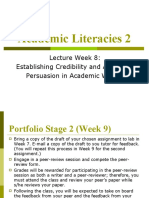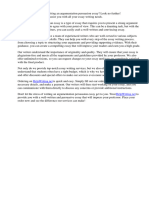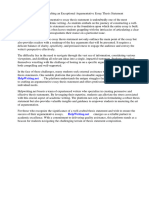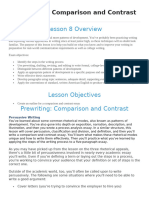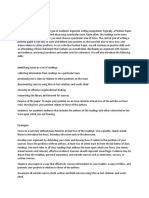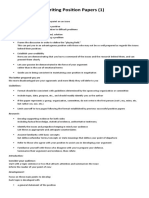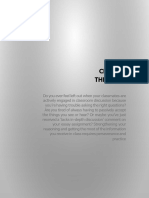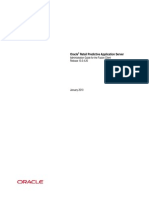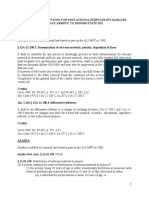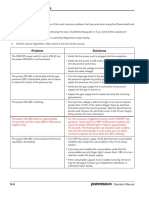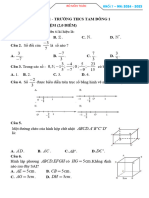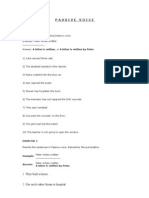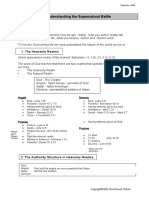CDI Top4ComparisonTactics
CDI Top4ComparisonTactics
Uploaded by
inshalfatima17Copyright:
Available Formats
CDI Top4ComparisonTactics
CDI Top4ComparisonTactics
Uploaded by
inshalfatima17Original Title
Copyright
Available Formats
Share this document
Did you find this document useful?
Is this content inappropriate?
Copyright:
Available Formats
CDI Top4ComparisonTactics
CDI Top4ComparisonTactics
Uploaded by
inshalfatima17Copyright:
Available Formats
RESOURCES
CAMBRIDGE DEBATE INSTITUTE
4TOP
COMPARISON TACTICS
TO EFFECTIVELY COMMUNICATE
EVIDENCE QUALITY AND SIGNIFICANCE
Often, winning an argument and a debate comes down to nothing more than
the quality of your evidence, as perceived by the judge. To win these crucial
evidentiary clashes, you need to be able to tell the judge in precise terms why
your evidence is more believable.
Comparison tactics lay the framework to effectively elevate evidence
When compared head-on against others, the following details help differentiate
your evidence and influence the way judges weigh your arguments.
METHODOLOGY
Present undeniable approaches
Is the evidence based on a survey? On one person's opinion?
On a peer-reviewed study? On a peer-reviewed meta-study?
The rigor of the research methodology is a major
differentiating factor.
Example: In a double-blind study with a sample size of 43,000... (more
reliable than a college study not accounting for confounding variables)
RECENCY
Highlight currency of research
How long ago was this evidence published? Especially when
making arguments about current events, evidence that is not
recent may no longer be relevant.
Example: Published only three months ago... (superseding prior
results from outdated technology)
AUTHOR QUALIFICATION
Cite quality credentials
Is the evidence from a professor? A blogger? A researcher?
Keep in mind who is most qualified to speak on a particular
topic.
Example: A professor of economics, mentor to Daniel Kahneman,
father of modern day behavioral economics... (as opposed to decision-
making hobbyist who studied art)
SOURCE OF BIAS
Note and define perspectives
Is the evidence from a partisan think tank? A politician? Keep
in mind the possible biases of the author on a particular
topic.
Example: Without conflict of interest... (allowing for reliable and
authentic points of views not skewed by personal agendas)
CDI Tutor Tips
These 4 comparison tactics help differentiate your evidence and
qualify your arguments over those of your opponent. True or not,
these are influential factors that inform judges how effective and
determine what basis your arguments have.
Reference as many of these comparisons as possible to standout in
a round. Leverage them to choose the strongest evidence during
preparation, drive momentum in your argument, and refute weak
ground your opponents may be standing on.
Want to learn how to string these comparison tactics
together and qualify your evidence? Reach out to us!
www.cambridgedebateinstitute.com
team@cambridgedebateinstitute.com
You might also like
- Guide To Writing An Argumentative Research PaperDocument5 pagesGuide To Writing An Argumentative Research Paperh00yfcc9No ratings yet
- Christmas Nativity Set2Document26 pagesChristmas Nativity Set2alejandra gonzalez100% (6)
- Disclosure TheoryDocument5 pagesDisclosure TheoryMatthew KimNo ratings yet
- Loan Agreement: Acceleration ClauseDocument2 pagesLoan Agreement: Acceleration ClauseSomething Suspicious100% (1)
- Research Debate 2010 2-1-10Document26 pagesResearch Debate 2010 2-1-10Asep SuhendarNo ratings yet
- Academic Literacies 2: Lecture Week 8: Establishing Credibility and Authority Persuasion in Academic WritingDocument29 pagesAcademic Literacies 2: Lecture Week 8: Establishing Credibility and Authority Persuasion in Academic WritingAJ TabuenaNo ratings yet
- Prezentare Diana MaradroviciDocument25 pagesPrezentare Diana MaradroviciMarina DiaconescuNo ratings yet
- Categories of Academic WritingDocument10 pagesCategories of Academic WritingmemymzitoNo ratings yet
- Week 5 - Critical Reading and WritingDocument25 pagesWeek 5 - Critical Reading and Writingwisst27vcNo ratings yet
- Two Key Concepts For An Effective Thesis StatementDocument6 pagesTwo Key Concepts For An Effective Thesis StatementbeacbpxffNo ratings yet
- Argumentation Persuasion EssayDocument6 pagesArgumentation Persuasion Essayfaveg0wawem3No ratings yet
- Lesson 8 - Legislative BranchDocument21 pagesLesson 8 - Legislative BranchJuliemer RitchaNo ratings yet
- Fourpillars of Reasonable ArgumentDocument35 pagesFourpillars of Reasonable ArgumentGuillermo AlvarezNo ratings yet
- How To Create An Argumentative Thesis StatementDocument6 pagesHow To Create An Argumentative Thesis Statementsusancoxarlington100% (2)
- Stages of Academic WritingDocument2 pagesStages of Academic WritingMouaci NwlNo ratings yet
- Writing A Thesis For An Argumentative EssayDocument6 pagesWriting A Thesis For An Argumentative Essaygjgm36vk100% (2)
- What Is A Persuasive EssayDocument3 pagesWhat Is A Persuasive EssayMicaela EncinasNo ratings yet
- Writing An ArgumentDocument2 pagesWriting An ArgumentKyle M. SantosNo ratings yet
- Understanding Evidence: Type of Evidence General PurposeDocument1 pageUnderstanding Evidence: Type of Evidence General PurposesamanthaNo ratings yet
- Critical Thinking Guide - FINALDocument4 pagesCritical Thinking Guide - FINALRashmi MehrotraNo ratings yet
- Support Your Thesis Statement by Utilizing Effective Evidence and DetailsDocument8 pagesSupport Your Thesis Statement by Utilizing Effective Evidence and Detailsafkogftet100% (1)
- ReviewerDocument3 pagesReviewerNicole HernandezNo ratings yet
- Thesis Claim WarrantDocument5 pagesThesis Claim Warrantjpcbobkef100% (2)
- Argumentative Essay Thesis StatementDocument8 pagesArgumentative Essay Thesis StatementCustomWrittenPaperUK100% (1)
- Casewriting in LD: by John Peterson Cherokee High School DebateDocument14 pagesCasewriting in LD: by John Peterson Cherokee High School DebateJohn PetersonNo ratings yet
- Pre WritingDocument13 pagesPre WritingijphotosbzNo ratings yet
- Argumentative EssayDocument8 pagesArgumentative EssayGODHARAN A/L THYAGARAJAN KPM-GuruNo ratings yet
- SSLM RWS Q4 Week 3Document4 pagesSSLM RWS Q4 Week 3Raquel ArtisuelaNo ratings yet
- Research Debate 2010 2-1-10Document26 pagesResearch Debate 2010 2-1-10Shamil UsrahNo ratings yet
- Argumentation Group 4Document4 pagesArgumentation Group 4Nicole DE QUIROZNo ratings yet
- Debate and FRQ (1)Document12 pagesDebate and FRQ (1)luaox.infoNo ratings yet
- Writing An Argumentative Essay English Presentation in Blue Illustrative StyleDocument21 pagesWriting An Argumentative Essay English Presentation in Blue Illustrative Stylecinderelac146No ratings yet
- PositionDocument9 pagesPositionkristelle ducayNo ratings yet
- Allyza Eapp Reviewer - 2nd QDocument42 pagesAllyza Eapp Reviewer - 2nd QAllyza LorenteNo ratings yet
- Argumentative EssaysDocument20 pagesArgumentative EssaysGODHARAN A/L THYAGARAJAN KPM-GuruNo ratings yet
- Thesis Is An ArgumentDocument5 pagesThesis Is An ArgumentAndrea Porter100% (2)
- Literature Review Argumentation TheoryDocument5 pagesLiterature Review Argumentation Theoryc5hc4kgx100% (2)
- Final 6-8 Writing ModuleDocument59 pagesFinal 6-8 Writing ModulePeache Nadenne LopezNo ratings yet
- CRWT MidtermDocument16 pagesCRWT MidtermMary Tyfanie QuilantangNo ratings yet
- Critical PDFDocument8 pagesCritical PDFRebecca MooreNo ratings yet
- Who Is An EntrepreneurDocument35 pagesWho Is An EntrepreneurShailja DixitNo ratings yet
- Thesis Argument DefinitionDocument5 pagesThesis Argument Definitionlizbrowncapecoral100% (2)
- How To Write A Thesis Statement ArgumentativeDocument8 pagesHow To Write A Thesis Statement ArgumentativeScott Bou100% (2)
- What Is A Position PaperDocument7 pagesWhat Is A Position PaperRico RilleraNo ratings yet
- How To Start A Good Argumentative Thesis StatementDocument4 pagesHow To Start A Good Argumentative Thesis Statementrebeccadiamondrochester100% (2)
- Thesis Argument DifferenceDocument8 pagesThesis Argument DifferencePaySomeoneToWritePaperInglewood100% (2)
- 7 Rules For Persuasive DissentDocument1 page7 Rules For Persuasive Dissentpepe ordoñezNo ratings yet
- What Is A Thesis For A Persuasive EssayDocument5 pagesWhat Is A Thesis For A Persuasive EssayBuyCustomPapersOnlineSingapore100% (2)
- Thesis Statement Persuasive Essay ExampleDocument5 pagesThesis Statement Persuasive Essay Examplesdeaqoikd100% (1)
- Thesis Claim AssertionDocument4 pagesThesis Claim Assertionfopitolobej3100% (2)
- Thesis and Arguments ExamplesDocument8 pagesThesis and Arguments Examplesangelaovertoncolumbia100% (2)
- Critical Thinking IntroDocument4 pagesCritical Thinking Introreskysteve1No ratings yet
- Writing A Position PaperDocument7 pagesWriting A Position PaperLorelei B RecuencoNo ratings yet
- WRD104-335 Persuasion & ProposalsDocument9 pagesWRD104-335 Persuasion & ProposalsKate FlomNo ratings yet
- Critical WritingDocument22 pagesCritical WritingHUIJUN NIUNo ratings yet
- Critical Writing v1 0Document4 pagesCritical Writing v1 0Sarah WalkerNo ratings yet
- Define A Good Argumentative ThesisDocument7 pagesDefine A Good Argumentative Thesisdnrssvyt100% (2)
- Thesis Argument EvidenceDocument8 pagesThesis Argument EvidenceJoaquin Hamad100% (2)
- AssertionDocument39 pagesAssertionKilles SmileNo ratings yet
- English 9, Quarter 4, Week 1: Learning Activity SheetsDocument11 pagesEnglish 9, Quarter 4, Week 1: Learning Activity SheetsMary Grace CatubiganNo ratings yet
- RPAS - Administration Guide For The Fusion ClientDocument197 pagesRPAS - Administration Guide For The Fusion ClientFabiano RodriguesNo ratings yet
- Hazrat Muhammad (SAW) The Model of ToleranceDocument5 pagesHazrat Muhammad (SAW) The Model of ToleranceTahir ShahNo ratings yet
- Limits of Expressions InvolvingDocument27 pagesLimits of Expressions InvolvingNina HendreiNo ratings yet
- Lab-1 Protutorial PDFDocument16 pagesLab-1 Protutorial PDFSufi PisolNo ratings yet
- 2016 Physics Questionbank - BookDocument454 pages2016 Physics Questionbank - Bookdencos2006No ratings yet
- Imouse-1230732021628253-1.Ppt (Compatibility Mode) (Repaired)Document24 pagesImouse-1230732021628253-1.Ppt (Compatibility Mode) (Repaired)umesh kumarNo ratings yet
- Final Research Project (FRP) SynopsisDocument4 pagesFinal Research Project (FRP) SynopsisShreshth SharmaNo ratings yet
- War Is Sexy Sample GameDocument12 pagesWar Is Sexy Sample GameCharles CameronNo ratings yet
- Limits of Piecewise FunctionsHWDocument1 pageLimits of Piecewise FunctionsHWJohn Philip ReyesNo ratings yet
- Daily Dairy 23-10-2023Document3 pagesDaily Dairy 23-10-2023Afaq AhmedNo ratings yet
- Sample Investment Policy Statement ADocument4 pagesSample Investment Policy Statement AAna TapiaNo ratings yet
- Verb To Be: Write Down Am, Is, Are Write The Negative FormDocument1 pageVerb To Be: Write Down Am, Is, Are Write The Negative FormYorgi BIdoNo ratings yet
- Obscenity Exemptions For Educational Purposes Invalidates State Harmful-to-Minors StatutesDocument69 pagesObscenity Exemptions For Educational Purposes Invalidates State Harmful-to-Minors StatutesJudith Reisman, Ph.D.100% (4)
- PDC ProjectDocument14 pagesPDC ProjectAkash JainNo ratings yet
- Taco VS Trali - Back Up SlideDocument9 pagesTaco VS Trali - Back Up SlideRizma RachmiNo ratings yet
- OM 805780r2 PMX45 Change1Document1 pageOM 805780r2 PMX45 Change1Eduardo BarbosaNo ratings yet
- Dc16rn3523 CK Products SPAR Release 073.Xxx.086.15410Document19 pagesDc16rn3523 CK Products SPAR Release 073.Xxx.086.15410cristian_becheverriaNo ratings yet
- De Tham Khao Giua Ki 1 Toan 7 Nam 2024 2025 Phong GDDT Hoc Mon TP HCM TrangDocument23 pagesDe Tham Khao Giua Ki 1 Toan 7 Nam 2024 2025 Phong GDDT Hoc Mon TP HCM Trangdothithu2408No ratings yet
- Beluso vs. Municipality of Panay Gr. No. 153974Document7 pagesBeluso vs. Municipality of Panay Gr. No. 153974arriane joy insularNo ratings yet
- Chapter 8: Recursion: SolutionsDocument31 pagesChapter 8: Recursion: SolutionsEric Martin100% (2)
- Director of Lands v. CA and Bisnar, October 26, 1989Document3 pagesDirector of Lands v. CA and Bisnar, October 26, 1989ZeaweaNo ratings yet
- Passive VoiceDocument6 pagesPassive VoiceMaria MoschouNo ratings yet
- Understanding The Supernatural BattleDocument14 pagesUnderstanding The Supernatural BattleJoNo ratings yet
- Pneumonia KembolarDocument22 pagesPneumonia KembolarAdrian MallarNo ratings yet
- Pharmacon Hubungan Komunikasi Interpersonal Dengan Tingkat Kecemasan Pasien Sebelum Tindakan Pencabutan Gigi Di RSGM FK UnsratDocument7 pagesPharmacon Hubungan Komunikasi Interpersonal Dengan Tingkat Kecemasan Pasien Sebelum Tindakan Pencabutan Gigi Di RSGM FK UnsratNanda WarizkyNo ratings yet
- 2013 Mark SchemeDocument32 pages2013 Mark Schemeapi-305622763No ratings yet
- Centralized Borrowing & Lending Platforms: Thematic InsightsDocument13 pagesCentralized Borrowing & Lending Platforms: Thematic InsightsAlan StivelmanNo ratings yet
- Biochemistry of CancerDocument20 pagesBiochemistry of CancerJimmy WongNo ratings yet





